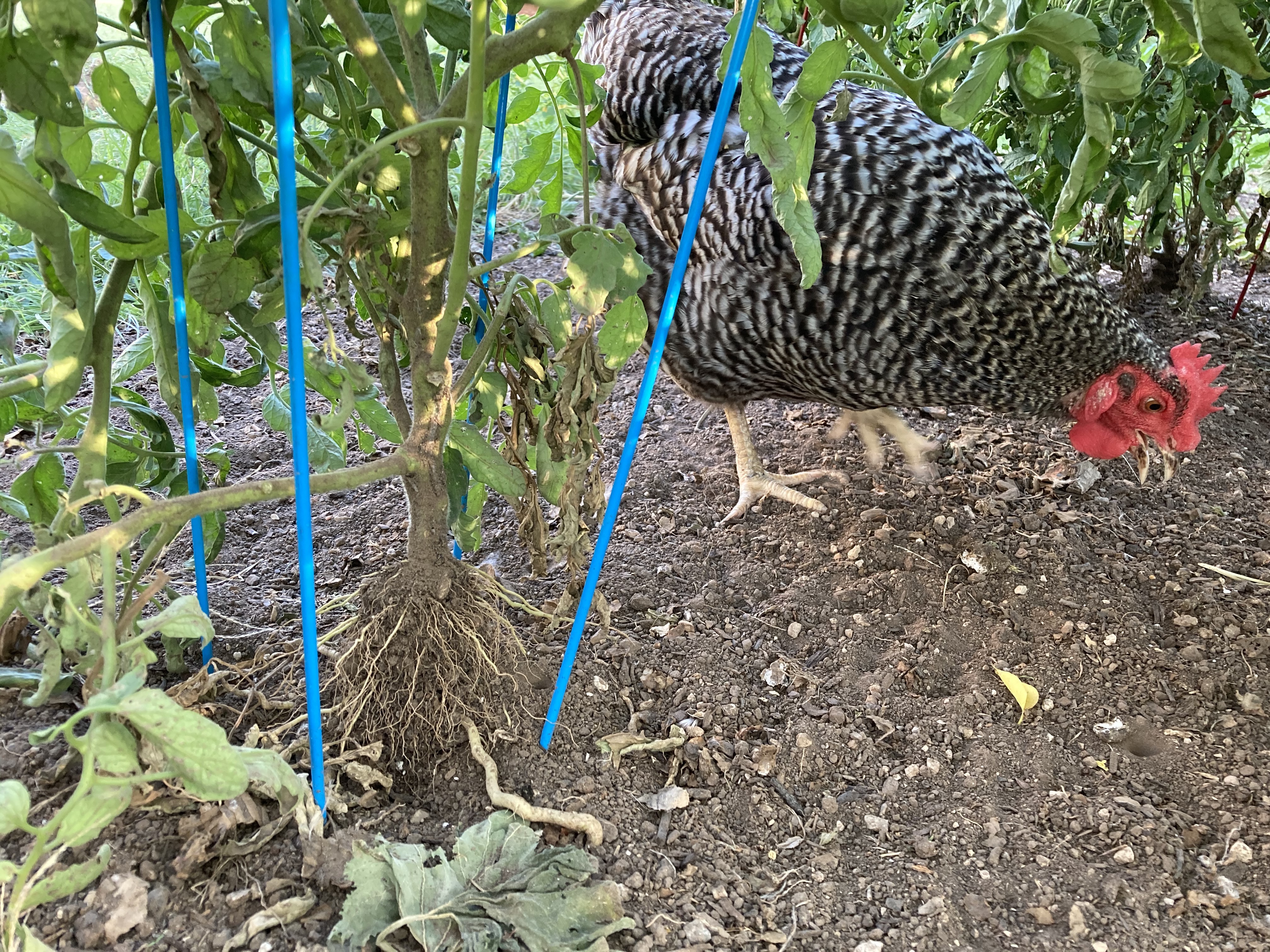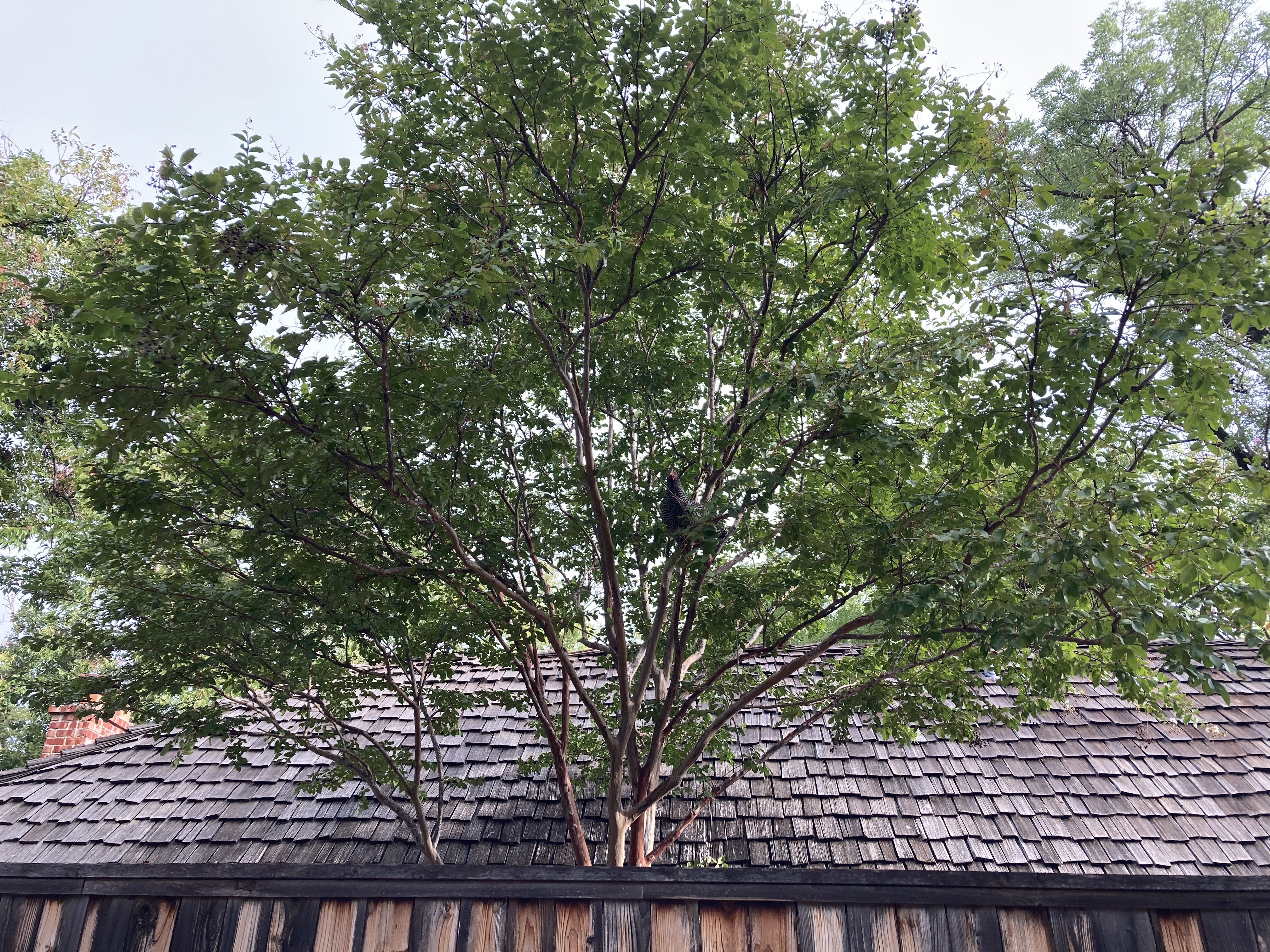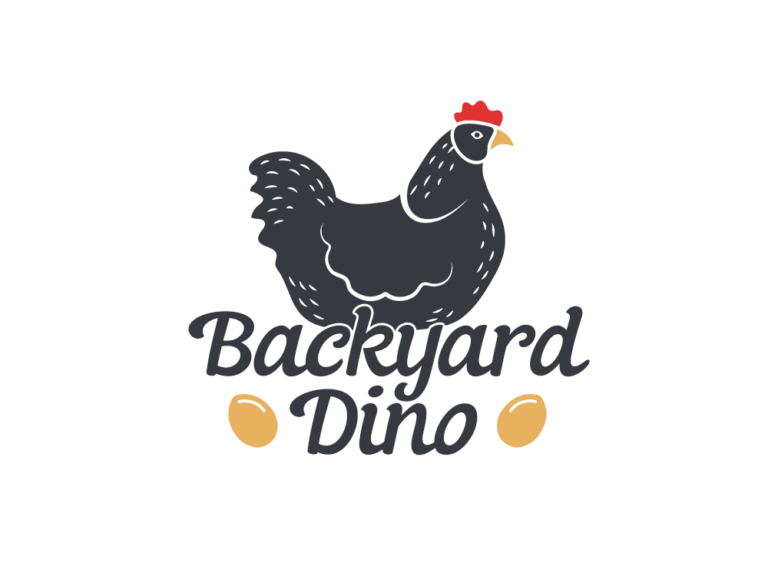Many backyard homesteaders like to have multiple sources of food they can harvest from their backyards, such as, eggs from chickens, produce from gardens, and fruit from trees. But what happens if these sources of food have a difficult time co-existing? For instance, chickens can wreak havoc on plants, including fruit trees.
In general, chickens are great for fruit trees because they provide natural pest control and fertilizer. However, they are capable of destroying the root system of younger trees and their manure can burn fruit trees if it’s too concentrated.
Keep reading to learn about the concerns and benefits of having chickens around your fruit trees.
⚠️ Concerns Related to Chickens and Fruit Trees
1. Chickens can expose the root ball of fruit trees
Chickens dust bathe as a way to keep their feathers and skin clean. Oftentimes, they choose to dust bathe in less than ideal locations, like a potted plant, the garden, or at the base of a fruit tree. The reason they will search out these types of locations to dust bathe is because the soil is often soft and cool in these areas due to them getting watered frequently and having shade from the plant.
When chickens dust bathe they will scratch around on the ground while laying down, kick up dust, and shake their bodies into the hole they have formed in the ground. This activity will often lead to small holes or low lying areas about the size of a chicken’s body in your yard. When chickens repeatedly dust bathe in the same area over time or multiple chickens bathe in the same area, the hole will get deeper and wider.
As a chicken dust bathes around the base of a fruit tree it can expose the root ball of the tree. This is a concern for young fruit trees that need to get their root system established. If not found soon enough and filled with dirt this root ball exposure can cause the tree to die.
I have some young peach trees and a plum tree in my backyard that the chickens have decided is a great place to dust bathe. When I let my chickens free range, I am constantly having to run them off and away from the base of the fruit tree.

To remedy this issue, you can add a cylindrical perimeter of chicken wire around the base of the tree to keep the chickens away.
Alternatively, you can add some large stones positioned close to the base of the tree with plenty of room to allow the tree to receive water and for growth of the tree base. This hard surface will deter your chickens from wanting to dust bathe at the base of the fruit tree and will keep them at a distance from the root ball.
As a side note, chickens will dust bathe at the base of many other plants, not just fruit trees. My chickens have destroyed several tomato plants by dust bathing at the base of the plants. They will also do this at the base of some of the shrubs in the backyard and have ruined several potted plants. They will get into the potted plant, crushing whatever was growing there and kick most of the soil out of the pot.

2. Concentrated chicken manure can damage fruit trees
Fresh chicken poop that is concentrated can damage newly developing fruit trees. Chicken droppings are high in nitrogen which is great for the plants. However, concentrated chicken manure that has not been composted can be too “hot” for it to be applied directly to plants as fertilizer.
Be careful letting your chickens spend a significant amount of time below fruit trees, as high nitrogen can be harmful to the fruit trees. The excessive nitrogen can cause the fruit trees to grow rapidly, resulting in bacterial blight.
This is usually only a concern if you have a large number of chickens that are congregating under the fruit trees for long amounts of time (i.e. for a year or more).
3. Low branches on fruit trees can allow chickens to escape the yard
Fruit trees are typically much smaller that other trees, even when they are full grown. Because of this, the branches can be lower to the ground which makes it easy for your chickens to fly into the tree.
Chickens are capable of flying up to about 5 or 6 feet into the air. They are especially prone to flying if they are young (pullets) or you have a bantam breed of chicken. As chickens grow to be full-size, they typically won’t fly since their bodies are too heavy for their wings to carry.
If your chicken happens to get into a fruit tree they could eat the fruit from the tree before you’re able to harvest it or, worse, hop over the fence and escape the yard.
When my chickens were still pullets, and right before they started laying their first eggs, I had a problem with one chicken in particular jump-flying to get on top of the 6 foot privacy fence in the backyard. From there, she would hop into the neighbor’s crepe myrtle tree and spend 30 minutes or so hanging out in their backyard. After the chicken had her fill of tree time, she would hop down into the neighbor’s backyard and give me a good chase before I was able to catch her and bring her back home.

Chickens are smart and if you have a chicken that is particularly prone to escapism, she will find any way to get out of her run or the yard. Low branches on a fruit tree can be extra tempting to these types of chickens that like to jump/fly and go exploring.
Read 5 Tips to Prevent Your Chickens from Flying for more tips on keeping your chickens in your yard and 4 (Somewhat) Easy Ways to Catch a Chicken in case they do escape.
✅ Benefits Related to Chickens and Fruit Trees
1. Chickens will eat fruit on ground
Chickens will eat any fruit from the tree that falls on the ground. This is great for many reasons, including:
- Less waste. There will be less waste of the fruit if the chickens are eating what falls to the ground. Squirrels and wild birds like to sample the fruit in trees and this is usually not the fruit that you want to finish eating, but your chickens will! Chickens will also eat the fruit that might be a bit past its prime and might be too squishy for your taste.
- Less feed. If your chickens are getting a generous snack of fruit daily they will consume less feed. As long as they are getting other vital nutrients in their diets, the fruit snacks should not be of concern.
- Healthy snack. Many chickens enjoy getting treats and the fruit can provide that snack for them. The difference between fresh fruit and any of the treats you buy at the store (such as scratch or dried earthworms) is that the fruit is a nutritious snack and you know exactly where it came from and how it was grown.
- Keeps pests away. If your chickens are doing a good job of cleaning up the dropped fruit from the ground, this will help keep other pests away. Raccoons especially love fruit and if they realize there is an easy source of it, they will be back night after night to get a helping. Raccoons are not something you want in your yard since they will eat eggs and have been known to attack chickens at night if there is a way to get inside the coop.
Some people are concerned about chickens eating peaches because of the pit. I have fed my chickens many peaches over the years and they will leave the pits in the yard. They are smart and typically know what they can and can’t eat. Just be aware that the peach pits can lead to volunteer peach trees (if you’re lucky!).

2. Natural pest control
Chickens serve as natural pest control around the base of fruit trees. They will eat any bugs on the ground that fall from the tree or bugs that could climb up the trunk.
The main benefit of using chickens as pest control is that you don’t have to use dangerous chemicals in your yard. Many pesticides are toxic to both humans and chickens alike.
Many people who raise chickens also grow gardens and the chemicals can end up on the food. Most backyard gardeners are choosing to grow their foods using organic methods, so chickens as pest control is a great alternative to chemicals.
Around fruit trees, let the chickens free range in the spring to eat any emerging insects and then again in the fall before the insects go underground for the winter. This will reduce the likelihood of there being too much fresh manure at the base of the trees that can lead to bacterial blight.
Here are some of the bugs that can be found in many backyards that will be eaten by chickens:
- Grasshoppers
- Termites
- Earthworms
- Beetles
- Mosquitoes
- Fleas and ticks
- Moths
- Army worms
- Spiders
For more details on this topic, check out Using Chickens as Natural Pest Control.
3. Manure can be used as natural fertilizer
Manure can be used as natural fertilizer for established fruit trees.
As chickens walk under fruit trees and scratch the ground, they will stop occasionally to poop. Chicken droppings are high in nitrogen which is great for the plants.
As long as there is not too high a concentration of fresh chicken droppings, you should not have issues with the manure burning your fruit trees. If you are worried about too much fresh manure, spray it down with water and that will help to break it down.
4. Fruit trees provide shade to chickens
Fruit trees provide shade to chickens during hot weather. While sunlight is necessary for a chicken’s good health (see this post for all the reasons why), they are sensitive to heat.
The shade from fruit trees can keep your chickens cool during warmer weather. When chickens have access to shade, they will seek it out when they become too warm. Keep in mind that as the sun moves throughout the day, so will the shaded areas in your yard.
Another benefit of fruit trees is that during the winter the leaves will fall off the trees and allow sunlight to reach your flock. This will help keep the chickens warm in cold weather.
5. Fruit trees provide protection from predators
The area under trees also serves as a good place for chickens to escape predators or hide from being seen.
When my Barred Plymouth Rocks are in the shade they are virtually impossible to see. I can typically only see them in the shade if I happen to see the bright red of their comb or wattle, or if I know that they are there and to look for them specifically.
In summary, there are many benefits to raising chickens and fruit trees together. Just watch out for the few concerns listed above and you should have many healthy, fresh eggs and a great harvest of fruit! Plus, another benefit is happy chickens! 🐔


